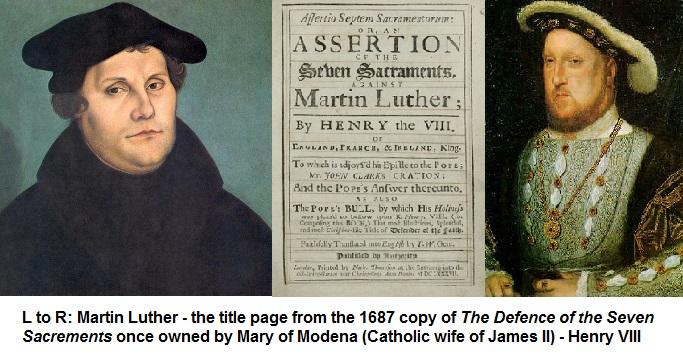SORRY IS THE HARDEST WORD – LUTHER'S LETTER TO HENRY VIII
Most of us have fired off an email or text in anger, and then regretted it, but this is actually nothing new. The arrival of the printing press in Europe made it all too easy to vent one’s spleen in public and one person who tried to take back his stinging words attacking Henry VIII was Martin Luther.
It’s well known that, before his marital troubles caused Henry’s rift with the papacy, the king of England was an ardent supporter of Catholicism and in 1521 he published ‘In Defence of the Seven Sacraments’ as a rebuttal of Luther’s criticisms of the Roman Catholic Church. The closing paragraph of Henry’s theological treatise leaves readers in no doubt as to his views on the new Protestantism:
“Do not listen to the Insults and Detractions against Christ’s Vicar, which the Fury of the little Monk spews up against the Pope; nor contaminate Breasts sacred to Christ with impious Heresies, for if one sows these he has no Charity, swells with vain Glory, loses his Reason, and burns with Envy…”
The book was an instant best seller and Pope Leo X (to whom the work was dedicated) granted Henry the title ‘Defender of the Faith’ in gratitude. Soon two German translations were being circulated on the continent and this prompted a riposte from Luther himself. In his polemic, “Against Henry King of the English”, published in 1522, Luther also doesn’t pull any punches and he describes Henry as a ‘wretched scribbler’, a ‘sacrilegious despoiler’ and even a ‘vessel of Satan’ before ending:
“In conclusion, if my rough speech towards the King offends, let him have this for his reply… I have kept from the virulence and lying with which the King's book is crammed. Nor is it much if I despise and bite this earthly King, since he has not feared with his words to blaspheme the King of heaven, and to take away by his virulent lies from His holiness...”
Henry responded by ordering Thomas More to write an official rebuttal and in 1523 Sir Thomas duly published his ‘Response to Luther’ under a pseudonym. That might have been an end to the matter, but some of Luther’s supporters began to insist that Henry was actually a secret protestant. In the hope of a reconciliation with a potentially powerful ally, Luther wrote a grovelling letter to Henry, dated September 1st 1525, in which he begs for the king’s forgiveness:
“Grace and peace in Christ our Lord! Most Serene King. Although I might well fear to write your Majesty, having deeply offended you through my little book hurriedly written at the instigation of people unfriendly to your Royal Highness, still I am impelled to do so by your natural goodness of heart, which I hear daily praised, and also knowing that your Majesty, being aware he is mortal, will not keep an undying enmity and over and above, I am informed by trustworthy people that the little book against me, so far beneath the dignity of the King of England, issued under your Majesty's name, was not really written by you, as those crafty sophists dare affirm."
Luther goes on to blame Cardinal Wolsey: “...that monstrosity, hated of both God and man… the destroyer of your Majesty's kingdom,” and he even offers to write another book praising Henry. Unfortunately the king of England was in no mood to be magnanimous. In early 1526 Henry writes back to Luther and states that he is only sending a reply to disavow the notion that he favours the ‘little monk’. Henry also states that he alone was the author of The Defence of the Seven Sacraments and praises Wolsey effusively before saying:
“…England is well rid of apostate friars, who, deserting his kingdom and Christ's faith, are wallowing in lust…”
This mention of lust is a thinly veiled reference to Luther’s marriage to a nun and Henry goes on to urge his nemesis to give up his wife, bewail his errors and either publicly to preach the truth or else to retire to a convent. After this bitter exchange, Luther wisely let the matter drop but it was hardly surprising that ‘the little monk’ refused to support Henry when, a decade later, England’s king finally broke from Rome.
